Marketers are facing burnout from juggling disjointed tools, rising acquisition costs, and the pressure to personalize campaigns at scale. However, despite increased investment in digital strategies, many organizations still rely on manual workflows and static automation rules that fail to meet modern customer expectations. AI marketing automation offers a smarter approach to planning, personalizing, and optimizing campaigns across channels in real-time.
A Nielsen report indicates that 71% of brands with large advertising budgets plan to utilize AI to personalize and scale their ad campaigns. Yet, the overall adoption of AI for purely marketing purposes remains at 22% (according to an IBM report). Nevertheless, investing in AI marketing automation tools is not just for large businesses, but a solution that can solve many operational and consistency challenges for businesses of all sizes.
To truly benefit, businesses need purpose-built AI marketing automation platforms that can align with their business goals, existing marketing stack, and scale campaigns while embodying the brand voice.
In this guide, we’ll decode what AI marketing automation means, explore its best applications, and show you how to move from fragmented tools to a fully integrated AI-powered strategy with Birdeye’s AI platform for hyperlocal marketing.
Table of contents
- What does AI marketing automation really entail?
- AI marketing automation vs traditional tools: What’s changing?
- Key capabilities of AI marketing automation tools
- Benefits of using AI marketing automation tools for modern marketing teams
- Common challenges of AI and automation in marketing
- What are the top AI marketing automation strategies for 2026?
- How do you choose the right AI marketing automation partner?
- Examples of AI marketing automation in action: Use cases and how Birdeye delivers
- Final thoughts: The future of AI and marketing automation
- FAQs about AI marketing automation
- Streamline marketing automation with Birdeye AI tools
What does AI marketing automation really entail?
AI marketing automation leverages artificial intelligence with automated workflows to plan, execute, and optimize marketing activities across multiple channels, eliminating the need for constant manual intervention. Unlike traditional automation, which relies on static rules, AI brings intelligent decision-making into the process, enabling businesses to scale their marketing efforts with precision and personalization.
At its core, AI marketing automation is not just about scheduling emails or triggering messages; it is about using data-driven insights for informed and strategic decisions. By applying machine learning, AI algorithms, and natural language processing, businesses can understand customer behavior, analyze intent, and respond in real time. This can include
- Automating social media content
- Personalizing website experiences
- Recommending offers based on past behavior
- Predicting churn or next-best actions
- Streamlining review requests and responses
“AI is like fire; it can either help or hurt depending on how you use it. With Birdeye’s automation features, you can optimize feedback collection, listing management, and customer engagement. Using AI wisely and ensuring your teams are trained to harness it effectively is essential. It’s no longer an option but a must-have tool in any strategy.”
Jason Christtley, Marketing Manager, Argus Professional Storage
AI marketing automation vs traditional tools: What’s changing?
Traditional marketing automation tools were designed to follow fixed rules, such as sending an email when a form is filled, assigning leads based on zip codes, or publishing a post at a scheduled time. While useful, these systems lack the intelligence to adapt, predict, or personalize beyond predefined triggers.
AI marketing automation, on the other hand, introduces adaptability, personalization, and continuous optimization into every layer of the marketing stack. It doesn’t just automate, it learns and improves.
Here’s how the two approaches compare:
| Capability | Traditional Marketing Automation | AI Marketing Automation |
| Content personalization | Based on static segments | Dynamic, real-time personalization using behavioral and contextual customer data |
| Campaign execution | Follows pre-set workflows | Learns from data to adjust timing, messaging, and offers mid-campaign |
| Channel adaptability | Focused on email/SMS | Unified strategy across multiple channels: search, social, web, email, chat |
| Feedback handling | Manual review and response | AI-generated responses that align with tone and context |
| Insights and reporting | Static dashboards | Actionable insights with predictive trends and anomaly detection |
| Scalability | Difficult across many locations | Automates branded experiences across hundreds of local markets effortlessly |
This shift is especially critical for multi-location businesses. A traditional platform may work for a single location, but scaling consistency and relevance across regions requires intelligent systems that can automatically adapt messaging, tone, and campaigns, while respecting each market’s unique context.
With Birdeye, businesses move from outdated workflows to intelligent automation that amplifies their brand, improves efficiency, and delivers measurable business outcomes.
Key capabilities of AI marketing automation tools
AI marketing automation empowers teams to make smarter, faster decisions beyond scheduling posts or sending emails. The right platform can streamline targeting, personalize experiences, and optimize performance across the entire funnel.
Here are the key capabilities to expect from AI marketing tools that automate your business processes:
- Smarter segmentation with predictive analytics: AI analyzes historical data, purchase behavior, and engagement trends to use machine learning or Generative AI and predict outcomes and segment audiences based on conversion potential.
- Personalization at scale across channels: AI marketing tools dynamically tailor messaging, visuals, and offers based on customer behavior, maintaining brand voice across multiple channels.
- Real-time campaign optimization: AI adjusts bidding strategies, delivery timing, and creative variations mid-campaign to maximize ROI.
- Conversational AI for 24/7 engagement: Smart chatbots handle FAQs, collect customer data, and escalate when needed, ensuring quick, brand-aligned responses.
- Automated content generation at scale: AI creates brand-safe emails, reviews, and social content based on defined templates and tone guidelines.
- Intelligent integration with existing marketing tools: AI platforms integrate across your CRM and analytics system to centralize workflows & enable cross-functional automation. Businesses get data-driven insights in addition to the basic data syncing functionalities from traditional marketing tools.
Together, these features transform traditional workflows into intelligent systems, enabling marketing teams to replace manual execution with real-time, AI-driven performance at scale.
Benefits of using AI marketing automation tools for modern marketing teams
AI marketing tools aren’t just about saving time to automate processes; they’re about transforming how your team works. From enhancing precision to unlocking revenue, these tools help businesses make smarter decisions, deliver more relevant content, and improve every stage of the customer journey.
Here’s how modern marketing teams are benefiting from AI-driven marketing automation:
1. Automate repetitive marketing tasks efficiently
Manually segmenting lists, scheduling posts, or crafting hundreds of emails across locations? AI solves that. It helps automate marketing tasks like A/B testing, content generation, lead nurturing, and post-scheduling, freeing teams to focus on high-impact work.
For multi-location brands, this means one-click workflows that scale personalized marketing efforts across regions with minimal input.
“We leverage AI to drive automation and streamline more repetitive tasks. AI has also given us the capability to analyze data efficiently. Data-driven decisions also eliminate much of the guesswork from our planning, especially in marketing campaigns. For example, New York is extremely diverse, and being able to communicate in multiple languages is crucial, especially in Queens. So I’ll just call out Queens. Navigating in one language is a challenge there. We, so, onboarded a HIPAA-compliant interpretation tool, which has proven crucial. “
Glenda Villanueva, Director of Marketing and Patient Communications, NY Spine Institute
2. Improve customer experience with real-time personalization
AI utilizes customer data, including engagement history and preferences, to deliver highly personalized offers and messaging. Whether it’s customizing a web banner or triggering an email series, personalization drives customer satisfaction and deeper engagement.
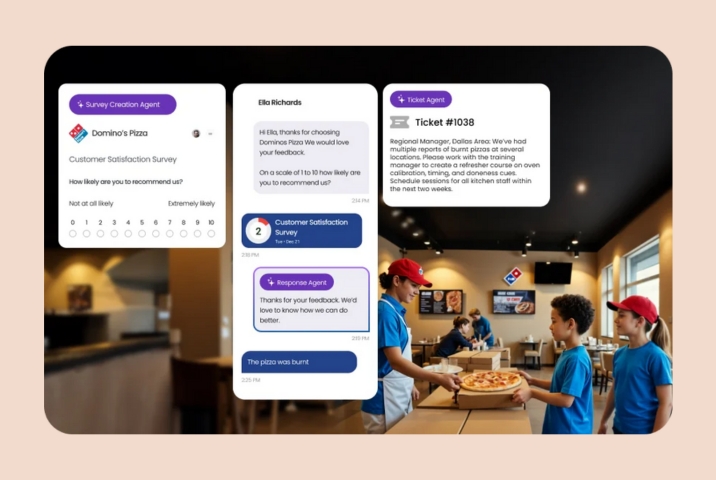
According to McKinsey, personalization at scale can lift revenue by 10–15%.
Birdeye results spotlight:
Rocky River Dental Management uses Birdeye’s AI and automation to enhance patient interactions and improve operational efficiency, creating deeper connections and driving growth. With Birdeye, the practice achieved:
1.7K reviews, a 300% increase: Automated, well-timed review requests resulted in a 4.9-star rating.
Rapid patient engagement: Automation achieved a median response time of just 4 minutes, supported by 14.3K active conversations since joining Birdeye.
Enhanced patient connections: Automated review responses and AI summaries boosted overall communication and re-engaged patients.
3. Enable predictive decision-making and better segmentation
With predictive analytics and machine learning, AI can anticipate customer needs before they arise. This helps build smarter marketing strategies and ensures that every message reaches the right target audience with the right offer at the right time.
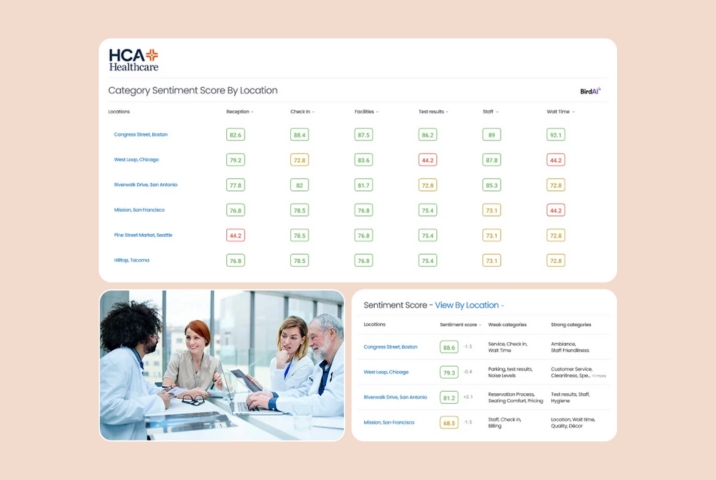
4. Optimize campaigns and maximize ROI
AI continuously monitors campaign performance and suggests optimizations, such as shifting budgets, tweaking creative elements, or pausing underperforming ads. These real-time adjustments can significantly enhance efficiency, enabling marketers to maximize ROI from every campaign.
5. Maintain brand voice at scale
One of the biggest challenges for multi-location businesses is maintaining consistency in content across different markets and channels. AI-powered tools like Birdeye’s Brand AI ensure every interaction, whether a review reply or social post, reflects your brand tone, style, and compliance standards.
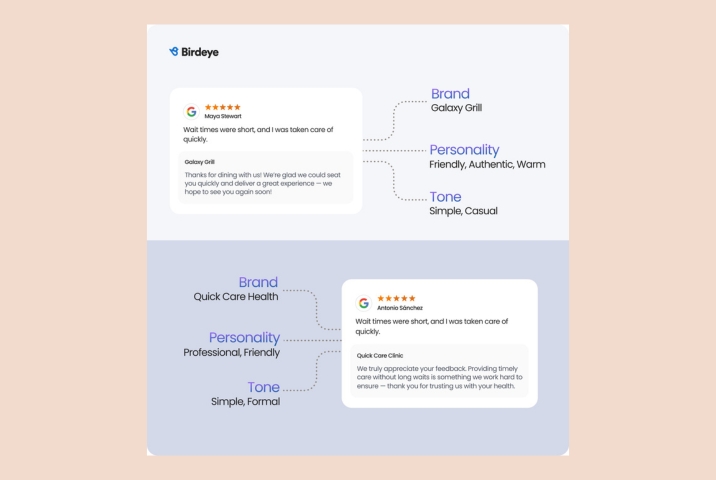
By adopting AI-powered marketing automation, teams can not only reduce costs and manual overhead but also improve outcomes across the board, from customer acquisition to retention and loyalty.
Common challenges of AI and automation in marketing
While AI marketing automation promises speed, scale, and precision, implementation isn’t without hurdles. Many businesses struggle to move beyond experimentation due to unclear goals, fragmented data, or AI tools that aren’t purpose-built for their industry or organizational structure.
Here are the top challenges marketing teams face when adopting AI in marketing automation:
1. Inconsistent brand voice and messaging
Generic AI tools often fail to accurately reflect a brand’s tone, compliance needs, or local nuances, especially across multiple locations. This can lead to off-brand messaging or customer confusion.
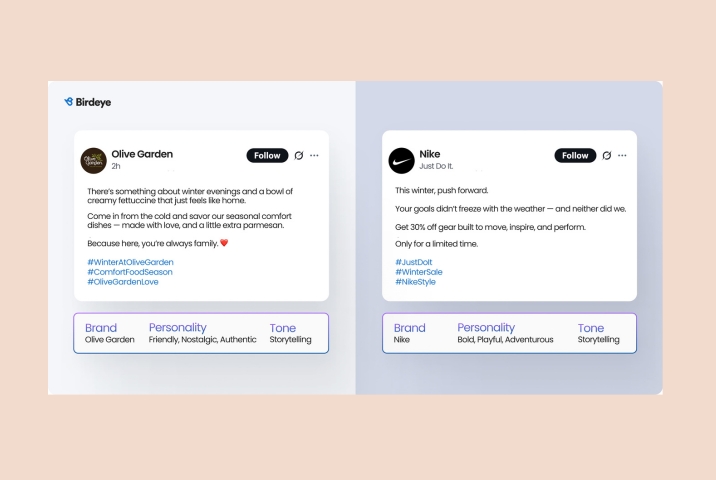
Solution: Platforms like Birdeye Brand AI are trained on your brand’s style and industry rules, ensuring brand-safe content across all customer interactions.
2. Poor data quality and disconnected systems
AI thrives on clean, structured customer data, but siloed CRMs, missing attribution, or outdated lists can derail automation efforts. Without unified systems, AI cannot deliver relevant recommendations or real-time personalization.
Brands must invest in platforms that centralize data across marketing workflows and multiple channels to unlock meaningful, actionable insights.
3. Lack of internal readiness or skilled personnel
Implementing AI requires more than just purchasing software; it also necessitates a comprehensive approach. It needs alignment between IT, operations, and marketing teams. Without proper onboarding and adoption plans, AI-powered marketing automation tools go underutilized.
Marketing leaders should focus on AI tools that offer intuitive UX, onboard automation templates, and guided playbooks tailored for non-technical users.
4. Concerns around transparency, bias, and data privacy
Automating decisions with artificial intelligence raises valid concerns: How is the model making decisions? Is it biased? Does it comply with evolving privacy laws, such as GDPR or CCPA?

Marketers should look for vendors that offer explainable AI, audit trails, and clear privacy protocols to ensure that ethical considerations are addressed from the outset.
These challenges don’t mean AI automation isn’t worth it, they simply point to the need for purpose-built solutions that understand marketing context, compliance requirements, and brand identity. Businesses that get this right don’t just automate—they differentiate.
What are the top AI marketing automation strategies for 2026?
To stay competitive, marketing teams need more than automation; they need intelligent systems that adapt, predict, and personalize at scale.
Here are the best AI marketing automation strategies CMOs and digital leaders are prioritizing in 2026:
1. Hyper-personalized content and recommendations
AI tools enable brands to deliver highly personalized experiences across channels while staying compliant with data privacy regulations. It tailors headlines, offers, creative assets, and delivery timing based on individual customer behavior, purchase history, and browsing patterns. By understanding micro-segments and intent signals, AI helps marketers move beyond broad targeting and create one-to-one experiences that resonate.
Recommendation engines powered by machine learning algorithms surface the most relevant content or product for each user, increasing both relevance and conversion rates.
2. Predictive customer behavior modeling
Using predictive analytics, AI identifies which leads are most likely to convert, which customers are at risk of churning, and what types of messages are most effective at each stage of the funnel. This enables intelligent lead scoring, smarter retargeting, and increased marketing efficiency.
Platforms like Birdeye apply these insights across local campaigns, allowing multi-location businesses to adjust promotions, content, and messaging t per region based on customer behavior, not assumptions.
3. Visual recognition for e-commerce and social media
AI can now scan and analyze user-generated photos, product visuals, and video content. This is especially powerful for the retail, food, and automotive industries, where visuals significantly influence buying decisions.
For example, AI can automatically tag visual assets, suggest relevant hashtags for social media posts, or generate dynamic content carousels based on engagement signals. All of these help marketers increase reach, relevance, and visual appeal across social and shopping platforms.
4. AI-generated content for omnichannel delivery
AI content generation tools are streamlining the process of creating blogs, ad copy, emails, and review responses at scale all while maintaining tone and ensuring compliance. When fine-tuned, these systems support consistent messaging across channels, saving time without sacrificing brand integrity.
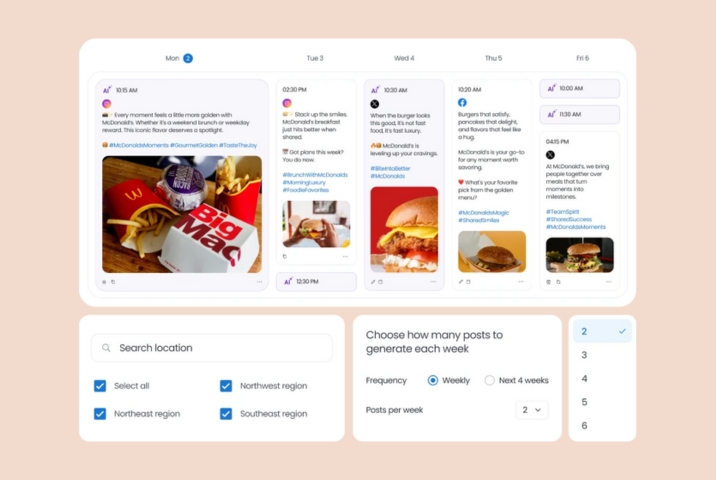
Birdeye’s Brand AI ensures all content generated adheres to your brand voice and adapts to local nuances, a key differentiator for businesses operating across multiple geographies.
5. Conversational AI to enhance real-time engagement
Conversational AI, including virtual assistants and smart chatbots, plays a central role in customer engagement. These tools can answer FAQs, capture lead data, provide personalized product recommendations, and escalate queries, all without human intervention.
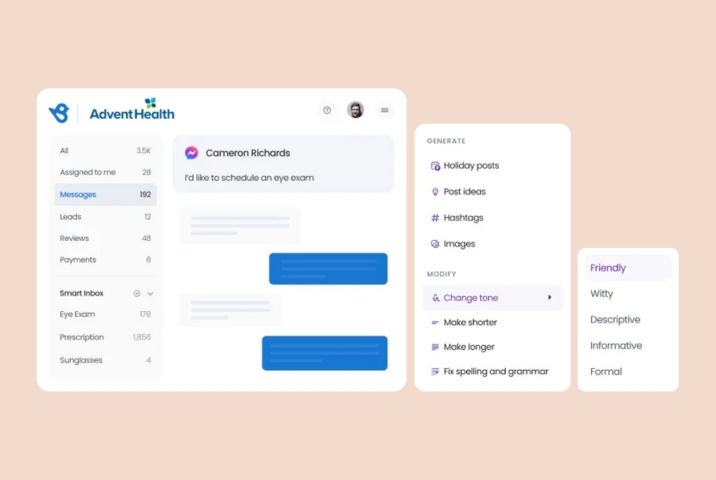
When combined with review response automation and feedback collection, conversational AI enables businesses to offer 24/7, on-brand engagement at scale.
Not all AI marketing automation tools are made equal and knowing how to choose the right solution can make all the difference in its effectiveness, adoption rates, and ROI.
Let us understand how to make that happen for your business.
How do you choose the right AI marketing automation partner?
Selecting the right AI marketing automation partner isn’t just a technology decision, it’s a strategic one. For multi-location businesses and enterprise marketing teams, the stakes are even higher. The ideal platform should not only simplify workflows but also align with your brand, industry, and long-term goals.
Here are the most critical factors to evaluate:
1. Look for AI agents trained for your brand and industry
Generic AI tools may be practical for general tasks, but they often struggle to understand the nuances of regulated industries or franchise-based business models. A purpose-built platform should include AI algorithms tailored to your vertical, customer personas, and brand tone.
Birdeye stands out by offering AI agents trained for specific sectors, including healthcare, automotive, legal, and real estate, delivering industry-grade intelligence from day one.
2. Ensure the platform integrates with your full marketing stack
An effective partner should integrate seamlessly with your marketing software, CRM, CMS, analytics tools, and platforms, such as Salesforce Marketing Cloud. Without integrations, AI automation becomes siloed and loses value.
Look for plug-and-play compatibility and open APIs that support scalable marketing workflows across your existing ecosystem.
3. Prioritize brand voice protection and compliance guardrails
AI-generated content that lacks oversight can lead to off-brand or non-compliant messaging. Your partner should offer features that preserve your brand voice and meet legal, regulatory, and cultural standards, especially if you operate across regions.
Birdeye’s Brand AI enables businesses to define their tone, style, and restricted phrases upfront, ensuring every interaction stays on message and brand.
4. Evaluate reporting transparency and performance analytics
The best AI marketing automation tools don’t just execute, they inform. Choose a platform that provides clear attribution models, campaign performance dashboards, and actionable insights across touchpoints.
Birdeye’s Insights AI surfaces competitive trends, sentiment patterns, and location-level results, making it easy for marketing teams to act on what’s working.
5. Confirm scalability for multi-location execution
What works for one store shouldn’t break at 300. A strong AI partner must support localization, reputation management, and social media management across regions, without forcing your team to rebuild every campaign from scratch.
With automation templates and centralized controls, Birdeye enables full-funnel execution that adapts to location while maintaining a single brand identity.
Automate local marketing with AI with Birdeye
Want to see the impact of Birdeye on your business? Watch the Free Demo Now.
Examples of AI marketing automation in action: Use cases and how Birdeye delivers
AI marketing automation isn’t just about saving time, it’s about driving better decisions, faster execution, and more intelligent customer engagement at scale. Below are the most impactful use cases across multi-location businesses and how Birdeye equips teams to solve them intelligently.
Reputation management at scale
AI marketing automation helps by analyzing review content, identifying sentiment, and generating on-brand responses instantly. This ensures that every customer is acknowledged promptly and with respect.
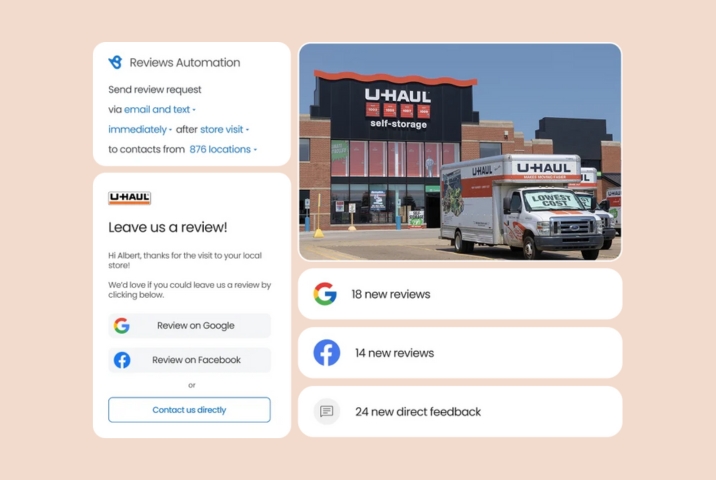
Birdeye’s Reviews AI automates responses across Google, Facebook, and industry-specific sites, maintaining brand voice while improving review response rates and local SEO performance.
Omnichannel content delivery without resource strain
AI generates channel-optimized content, recommends optimal posting times, and personalizes messaging based on audience data, all without relying on human bottlenecks.
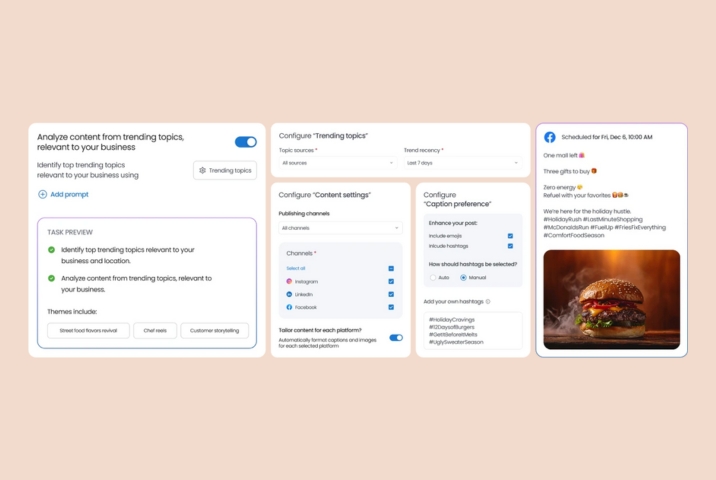
Birdeye’s Social AI automates local social media publishing across hundreds of profiles, creating brand-aligned posts and optimizing timing for each market.
Personalized email and campaign automation
AI-driven marketing automation dynamically triggers emails and offers based on customer behavior, such as visits, negative reviews, or service history. This maximizes relevance and conversion.
Birdeye’s AI agents execute behavior-based workflows that adapt in real time, enabling marketing teams to automate intelligently while keeping customer experiences personalized and timely.
Insights that drive smarter marketing decisions
AI aggregates cross-channel feedback, applies sentiment analysis, and highlights emerging trends, thereby transforming data into actionable insights in minutes.
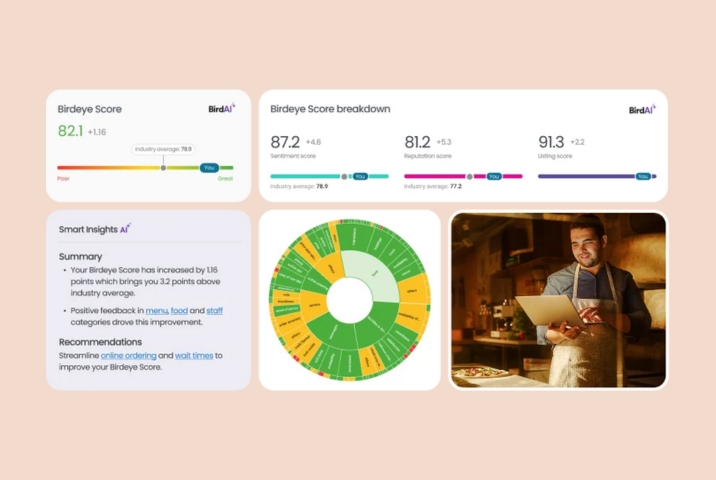
Birdeye’s Insights AI provides real-time, location-level insights into campaign performance, customer sentiment, and competitive benchmarks, informing agile, data-driven decisions.
24/7 customer engagement through conversational AI
Conversational AI enables round-the-clock engagement, handling inquiries, capturing leads, and escalating complex issues when needed, all while staying on brand.
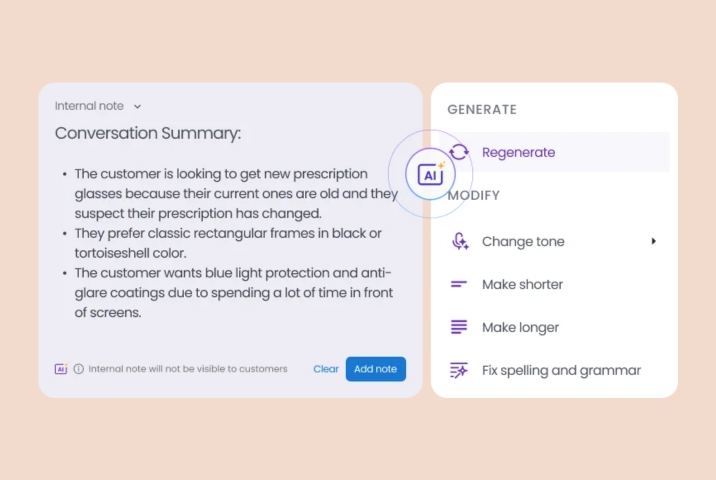
Birdeye’s Conversational AI powers intelligent chatbots trained on your FAQs, services, and tone of voice, delivering seamless, automated interactions that improve satisfaction and free up staff time.
Competitive intelligence without the guesswork
AI can monitor competitor behavior across channels (reviews, listings, social media, etc) and surface insights to guide positioning, pricing, and messaging decisions.
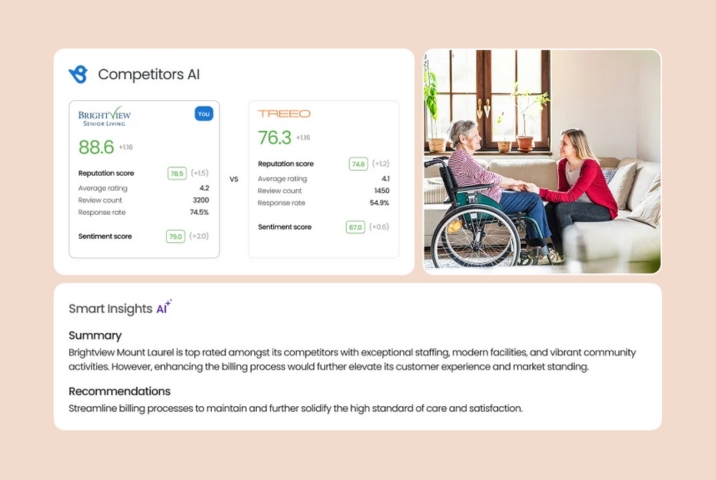
Birdeye’s Competitors AI provides real-time benchmarking against local competitors, highlighting where your brand leads, lags, and how to close the gap.
Final thoughts: The future of AI and marketing automation
As customer expectations grow and marketing becomes more complex, businesses need more than just automation. They need intelligence, adaptability, and brand-safe execution across every channel. That’s where platforms like Birdeye set a new standard.
With AI agents tailored to your brand and industry, integrated tools across social, search, and reviews, and predictive insights that guide real-time decisions, Birdeye enables marketing teams to do more with less. Whether you’re running campaigns across five cities or five hundred, the future of marketing lies in systems that learn, optimize, and scale with you.
If you’re ready to streamline your marketing operations, improve performance, and stay ahead of competitors, now is the time to adopt AI marketing automation, purpose-built for business outcomes.
FAQs about AI marketing automation
Marketing automation in AI refers to the use of artificial intelligence to plan, execute, and optimize marketing workflows automatically. It analyzes customer data, predicts behaviors, and personalizes content across multiple channels, improving both efficiency and results.
Yes, many marketing tasks like content generation, email sequencing, and performance reporting can already be automated using AI tools. However, human oversight remains critical for strategy, compliance, and creative direction.
Leading AI marketing automation tools include Birdeye, Salesforce Marketing Cloud, Adobe Sensei, and HubSpot. Birdeye stands out for its AI agents, which are trained to your brand and industry, making it ideal for multi-location businesses.
Yes, platforms like Birdeye offer comprehensive AI-powered marketing automation solutions. These tools manage reviews, listings, social media, and campaign optimization from one integrated dashboard.
As of 2025, approximately 78% of companies worldwide have adopted AI technologies in at least one business function, including marketing. This marks a significant increase from previous years, reflecting the growing reliance on AI to enhance marketing efficiency and effectiveness.
Streamline marketing automation with Birdeye AI tools
Birdeye is the only platform that combines brand-safe AI, industry-specific intelligence, and hyperlocal scalability, all in one unified solution.
With Birdeye, you can:
- Deploy AI agents trained for your brand and industry
- Automate review responses, social media posts, and email marketing campaigns
- Unify reporting and extract actionable insights with Insights AI
- Stay ahead of the competition with Competitors AI
- Maintain consistency and compliance with Brand AI
- Optimize campaign timing, targeting, and performance across locations
Thousands of multi-location businesses trust Birdeye to simplify execution and deliver tangible business outcomes.
Book a free demo to see how Birdeye transforms marketing automation for your business.

Originally published



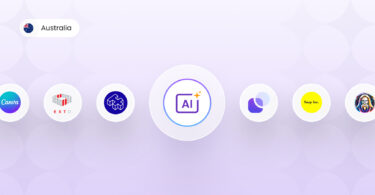
![[Feature image ] Customer-centric marketing- how to win, retain, and grow your customer base in 2025](https://birdeye.com/blog/wp-content/uploads/Feature-image-Customer-centric-marketing-how-to-win-retain-and-grow-your-customer-base-in-2025-375x195.jpg)




